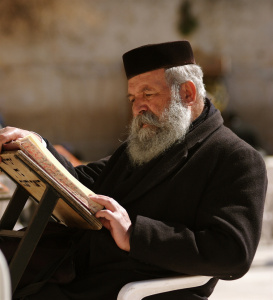Matzav.com is running an article entitled “EXPOSED: Women of the Wall Linked To Rabidly Anti-Israel Groups,” which it reprinted from Jerusalem Online. But if you go looking for the original article, you won’t find it. It has been taken down. In a comment posted to Matzav, the reporter, Rachel Avraham, doubles down on her accusations against Women of the Wall:
Women of the Wall threatened Jerusalem Online News with legal action, hence why it was removed. This is a routine scare tactic of radical leftists, since they only can tolerate having their own views published and are opposed to dissent. However, all of the facts in the article are documented and have been checked numerous times before publication. I am a serious investigative journalist and would not have published it otherwise. I want to thank Matzav.com for reprinting the article, so the article will be public at this moment. Women of the Wall had the article taken down because they threaten news organizations that don’t publish what they like. Since I proved beyond a doubt to my editor that Women of the Wall representatives lied to him about the accuracy of the article so he would be pressured into taking it down, we are discussing how to proceed. However, they can’t threaten journalists and then use the fact it was taken down as proof that the article is wrong.
Her assertions, if true, are a very strong indictment against key members of Women of the Wall, specifically board member Batya Kallus and chairwoman Anat Hoffman. Kallus is accused of helping funding for numerous anti-Israel organizations that called upon the United States to threaten cutting diplomatic ties, refused to recognize Israel as a Jewish State, and that were favorites in the infamous Goldstone Report.
Hoffman, the article reports, is the chairwoman of the Domari Society of Gypsies in Jerusalem, which in turn is part of the Grassroots al-Quds Network (using the Arabic name for Jerusalem). Grassroots al-Quds considers Jerusalem, the “Capital of the Palestinian People,” to be illegally occupied and refer to “the violent presence of illegal Israeli Settlements.” Among other services, it offers “a workspace and meeting point” “that provides activists with the tools and resources they need to organize, create and resist.”
Hoffman is not identified as the Chair of the Domari Society on its website, though she is identified in news articles as “working with the Domari,” helped establish the organization, and plays an active role. So I’m not sure which documents provided this information. But even if true, I’m not sure it’s quite the big deal that Avraham makes it out to be. The Domari Society seems to be a very small organization, essentially a one-woman show, that Hoffman might support because it’s a woman, and one who doesn’t get a lot of acknowledgment from Palestinian Arabs, either. She might simply benefit from the meeting spaces and support provided by Grassroots Al-Quds without being involved in its civil disobedience.
Either way, it’s not really a big surprise, and I’m not sure why Women of the Wall apparently threatened legal action. In a different comment, Women of the Wall Spokeswoman Shira Pruce says that “our participants and supporters come from all walks of life, political opinions, and Jewish denominations and we would never want to divide that by taking a political stand that does not directly effect free prayer at the Kotel.” If so, why would Women of the Wall demand an article about the other political positions of their “participants” be taken down?
Pruce says that “the ‘article’ has since been removed by the editor,” neither confirming nor denying that Women of the Wall played a role. That’s an interesting stance, given that newspapers usually don’t retract published articles without a really good reason. In addition, why did she put the word “article” in quotes? Whether or not it contained in accurate data, it was unquestionably a news article, and there is something jarring about the tenor of her dismissal of its contents.
And again, what’s the big surprise? Prior to the 1993 Oslo Accords that made support for terrorist organizations official Israeli policy, Hoffman was the chair of Women in Black, a “peace” group that advocated giving the Palestinians (aka, the PLO) all the “occupied territories,” including East Jerusalem — including, of course, the Kotel itself. By comparison, her involvement with the Domari Society seems like a minor detail.
Hoffman claims to just want civil rights, and in her interview on BBC called the Orthodox “a minority that I respect deeply.” I happen to remember being in Israel when she ran for her seat on the Jerusalem City Council with the Meretz party. Her advertising included an orange map of Jerusalem, with black splotches and dots showing Orthodox settlement in the city. It is clear that she believed that the Orthodox were more of a threat to her voters than were the Palestinians — during the middle of the Intifada. I think it was the Jewish Observer that published a copy of this piece of campaign literature, juxtaposed with an earlier map with dials turned to the percentage of Jews in various cities — in Germany. That earlier map was published by the Nazi newspaper, Der Stürmer. So the idea that Hoffman might be speaking out of both sides of her mouth with regards to Israel and the Kotel isn’t, again, any big surprise.
But even more than that, Women of the Wall portrays itself as a “women’s rights” organization and claim that women currently don’t have rights in Israel, and say they are helping to “architect” a new Kotel section “for Jewish [sic] and Israelis to pray free from persecution and religious coercion.” This certainly bolsters the impression of Israel as a repressive country where the rights of minorities are not respected.
So it’s not a question as to whether Women of the Wall is actively harming Israel’s image and reputation, internationally. The only question is whether that is simply collateral damage in their war on Jewish tradition — or a desirable if secondary goal.
 Did you ever notice that the first three plagues were not performed by Moshe?
Did you ever notice that the first three plagues were not performed by Moshe?
 “Yissachar is a strong donkey, who rests between the borders. And he saw rest, that it was good, and the land that it was pleasant, but he bent his shoulder to accept [the burden] and became an indentured servant.” [49:14]
“Yissachar is a strong donkey, who rests between the borders. And he saw rest, that it was good, and the land that it was pleasant, but he bent his shoulder to accept [the burden] and became an indentured servant.” [49:14] Not so, the passenger across the way, who thought this was an incredible act of kindness. He or she snapped a photo and posted it to an Internet sharing site, where it became an overnight sensation — nearly 5,000,000 views and counting.
Not so, the passenger across the way, who thought this was an incredible act of kindness. He or she snapped a photo and posted it to an Internet sharing site, where it became an overnight sensation — nearly 5,000,000 views and counting.